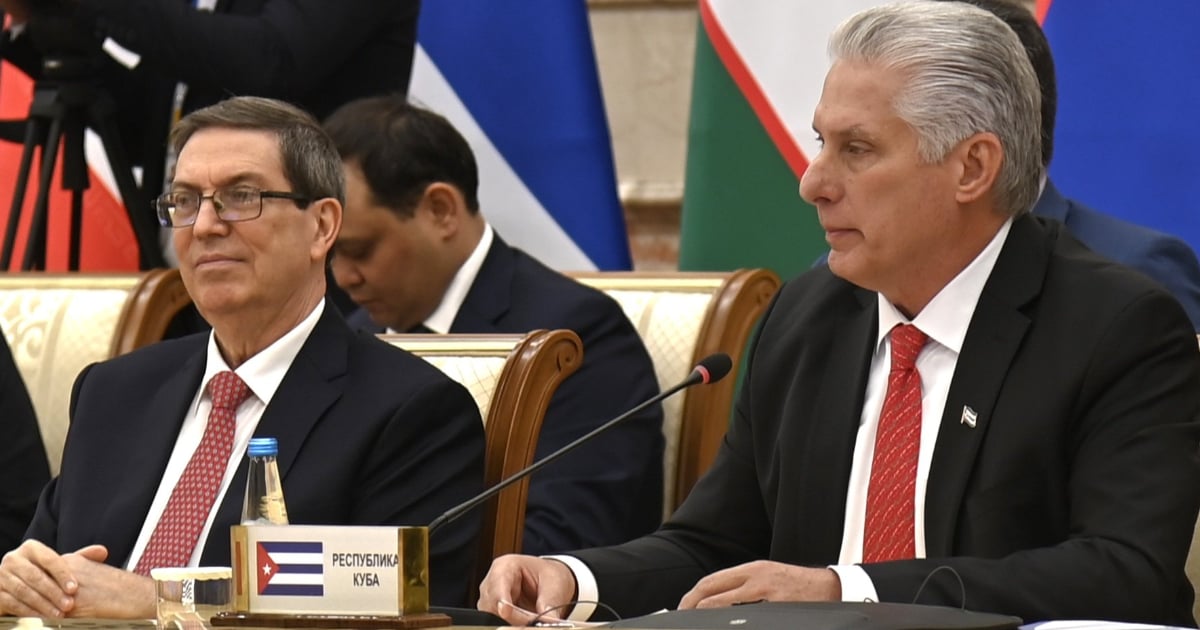In response to President Donald Trump's publication of a new National Security Presidential Memorandum, which tightens the embargo and further restricts economic and travel relations with the island, the Cuban government has reignited its anti-American rhetoric. The Ministry of Foreign Affairs (MINREX) issued a statement aimed at reinforcing the notion that "Cuba is a peaceful, stable, and supportive nation," despite the country being engulfed in one of its most severe crises yet.
However, the stability claimed by Havana in its official statement starkly contrasts with the harsh realities faced daily by millions of Cubans: power outages lasting over 24 hours, chronic shortages of food and medicine, a collapsing water system, deteriorating public transportation, rampant inflation, and unprecedented mass emigration.
MINREX's Statement: A Blend of Victimhood and Propaganda
The MINREX document "categorically" rejects the new presidential memorandum signed by Trump on June 30, labeling it as a "reissue" of the document from his first term in 2017. The Cuban government accuses Washington of attempting to "break the political will of the entire nation" and promoting an economic blockade aimed at "seizing control of the country and dictating its future."
The regime denounces these measures as being based on pretexts such as human rights, democracy, or religious freedom, calling them hypocritical. "It's an abusive, transgressive, and illegal conduct," the statement claims, further asserting that the sanctions are designed to destroy Cuban socialism and convert the economy to capitalism.
While Havana portrays itself globally as a victim of "imperialist aggression," the truth is that Cuba's economic and social collapse is primarily due to the government's incompetence and immobility, not the embargo. Private businesses struggle under bureaucratic strangulation, remittances from abroad are funneled through state channels that skim off funds, and productive sectors are controlled by military conglomerates like GAESA, which handle everything from tourism to imports.
Trump's Memorandum: Targeting the Repressive Apparatus
Trump's new National Security Presidential Memorandum (NSPM-5) reinstates and strengthens the harshest measures from his first term. Specifically, the document:
- Prohibits all financial transactions with companies controlled by the Cuban military, especially GAESA, the regime's economic arm.
- Bans U.S. tourism to the island and imposes detailed audits and records to ensure compliance.
- Reaffirms the existing economic embargo and commits to opposing any attempts at repeal in international forums.
- Eliminates incentives for illegal migration, maintaining the removal of the "Wet foot, dry foot" policy.
- Orders the drafting of reports on human rights, arbitrary detentions, and repression of civil society.
- Promotes free internet access, press freedom, and support for non-state private enterprise.
The Cuban government's narrative frames this memorandum as an attack on the entire populace, yet the document clearly aims to dismantle the repressive apparatus and the economic-military elite sustaining it. Trump's strategy is grounded in a fundamental principle: any economic relief that strengthens the military or intelligence services of the regime—and not the civil society—fortifies the dictatorship, not the people.
Official Reactions: Victimhood Without Self-Criticism
Prior to the official MINREX statement, Foreign Minister Bruno Rodríguez Parrilla had labeled the memorandum a "criminal act" and a "human rights violation" that hinders the country's development. On his X account, he blamed the embargo for "punishing the entire Cuban population."
Meanwhile, Miguel Díaz-Canel asserted that "the impact will be felt, but we won't be subdued," a tone intended to convey firmness but clearly reflecting concern about the new external pressure. Díaz-Canel failed to mention that while he speaks of "resistance," the people can endure no more: hospitals lack basic medications, power outages leave entire cities without electricity, and the average salary is insufficient to buy a liter of oil.
He also did not acknowledge that the real "blockade" suffocating the island is internal: a system that bans freedom of association, independent press, political parties, full private ownership, and power alternation. The message from MINREX attempts to project an image of unity and strength, but in reality, it is a smokescreen to conceal the regime's profound internal decay.
The only businesses still willing to engage with Cuba are those navigating an environment dominated by corruption, legal risks, and uncertainty, severely limiting any prospects for sustainable development. Meanwhile, the regime responds to sanctions with the same rhetoric of decades past, offering no concrete solutions to improve the lives of Cubans. In the name of "sovereignty," they keep the country in ruin.
And so, amidst power outages, repression, and empty speeches, the government insists that "Cuba is a stable country."
Understanding the Impact of U.S. Policies on Cuba
What are the key points of Trump's new National Security Presidential Memorandum regarding Cuba?
The memorandum prohibits financial transactions with Cuban military-controlled companies, bans U.S. tourism to Cuba, reaffirms the economic embargo, eliminates incentives for illegal migration, and promotes free internet access, press freedom, and support for non-state private enterprise.
How does the Cuban government view the U.S. embargo?
The Cuban government views the U.S. embargo as an attempt to break the political will of the nation and as a hypocritical act based on pretexts such as human rights and democracy. They claim it is abusive and aimed at destroying Cuban socialism.
What are the internal challenges facing Cuba?
Cuba faces severe internal challenges such as power outages, shortages of food and medicine, a collapsing infrastructure, rampant inflation, and mass emigration. These issues are exacerbated by a restrictive system that limits freedom and economic development.
